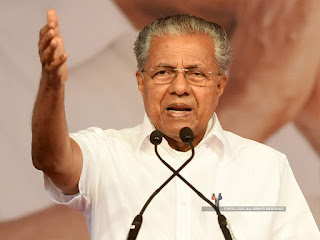Kerala, often referred to as "God's Own Country,"
has a rich political history marked by the dynamic leadership of its Chief
Ministers. Over the years, these leaders have played a pivotal role in shaping
the socio-economic landscape of the state. This article delves into the
contributions of the former Chief
Ministers of Kerala while shining a spotlight on the current leader,
Pinarayi Vijayan, who has been steering the state towards unprecedented
development since assuming office in May 2016.
E. M. S. Namboodiripad (1957-1959, 1967-1969):
The first Chief Minister of Kerala, E. M. S. Namboodiripad, was a stalwart in Indian politics. As the leader of the first democratically elected Communist government in the country, Namboodiripad laid the foundation for progressive policies in Kerala. His tenure witnessed the implementation of land reforms, which aimed at redistributing land from landlords to the landless. This transformative step set the tone for future Chief Ministers, emphasizing the importance of social justice and egalitarian principles.
K. Karunakaran (1977-1980, 1981-1987, 1991-1995):
K. Karunakaran, a seasoned politician and five-time Chief Minister, made substantial contributions to Kerala's infrastructure and industrial development. His leadership saw the initiation of major irrigation projects, aimed at transforming the agricultural sector. Karunakaran also focused on education and healthcare, laying the groundwork for Kerala's reputation as a state with high human development indices.
A. K. Antony (1977, 1995-1996):
A. K. Antony's brief tenure in 1977 and subsequent term in 1995-1996 is marked by his commitment to governance and anti-corruption initiatives. He introduced measures to improve administrative efficiency, promoting transparency and accountability. Antony's emphasis on clean governance left an indelible mark on Kerala's political landscape.
V. S. Achuthanandan (2006-2011):
V. S. Achuthanandan, known for his strong stance on corruption and pro-people policies, served as the Chief Minister from 2006 to 2011. Under his leadership, Kerala witnessed advancements in the healthcare sector, with the establishment of new medical colleges and the enhancement of primary healthcare infrastructure.
Oommen Chandy (2004-2006, 2011-2016):
Oommen Chandy, a four-time Chief Minister, focused on inclusive development and social welfare. His tenure saw the implementation of various welfare schemes targeting marginalized communities. Chandy also championed initiatives in the IT and tourism sectors, fostering economic growth.
Present Chief Minister – Pinarayi Vijayan:
Since assuming office in May 2016, Pinarayi Vijayan has been at the forefront of transformative governance in Kerala. He represents the Communist Party of India. His leadership has been characterized by a strong focus on infrastructure development, social welfare, and sustainable policies. The "Kerala Model" of development under Vijayan's guidance has gained acclaim globally.
Pinarayi Vijayan's administration has prioritized infrastructure projects, including the completion of the Kochi Metro and the development of road and transportation networks. His government's response to the COVID-19 pandemic has been widely lauded, showcasing Kerala's effective public health system.
Moreover, Vijayan has continued the state's legacy of social justice by implementing measures to uplift marginalized communities. The "Life Mission" housing project aims to provide homes to the homeless, contributing to the state's commitment to housing for all.
The Chief Ministers of Kerala, both past and present, have
left an indelible mark on the state's socio-economic fabric. From pioneering
land reforms to embracing technological advancements, each leader has played a
crucial role in Kerala's development. Under the steadfast leadership of
Pinarayi Vijayan, Kerala continues its journey towards progress, solidifying
its reputation as a beacon of successful governance.
